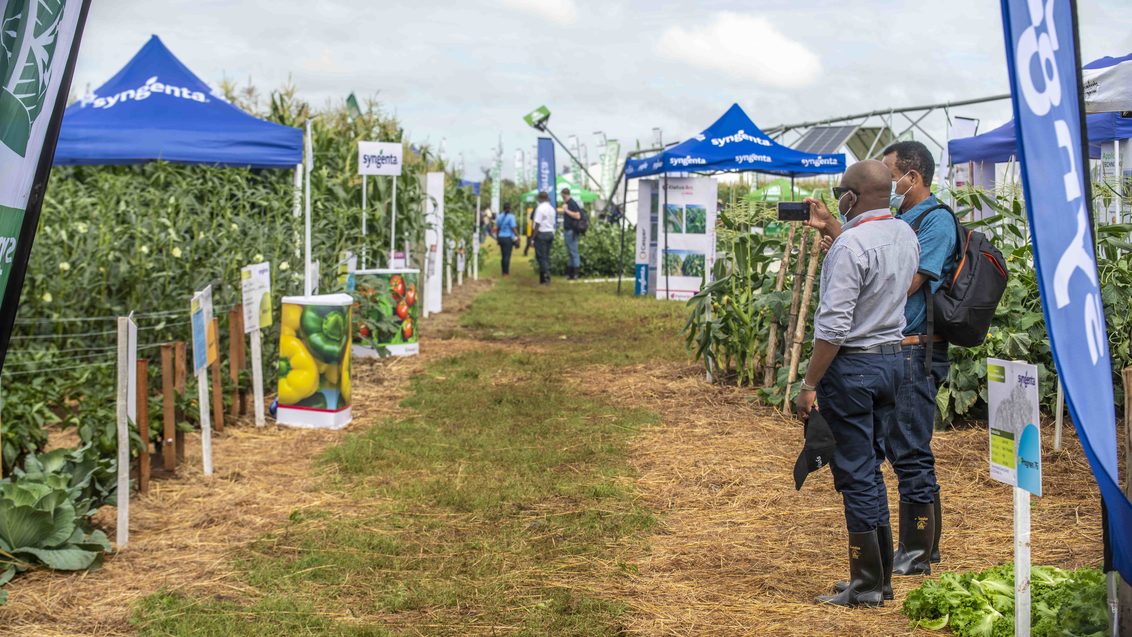Syngenta at Agritech Expo showcases its innovation powerhouse for improved food security

Syngenta showcased its Innovation Powerhouse for Zambia at the country’s biggest agricultural event, Agri-Tech Expo attended by the President of the Republic of Zambia Mr. Hakainde Hichilema. The event was held from 7-9 April against a backdrop of increasing food security challenges. During the Expo, Syngenta showcased its sustainable innovations to farmers, government representatives and an audience of key players in the agricultural business community.
The President personally visited Syngenta’s stand at the Expo and was presented Syngenta’s Innovation Powerhouse.
Jerome Barbaron (Africa and Middle East Business Unit Head for Crop Protection at Syngenta) and Given Mudenda (Syngenta’s Managing Director for Zambia and Southern African Business Area Head for Crop Protection at Syngenta) gave a keynote speech on the first day of the Expo where the new agricultural landscape of Zambia was discussed. Felix Tembo (Seedcare Key Account Manager, Southern Africa Business Area, Syngenta) contributed to the High-Level panel discussion on effective farm management.
Welcoming everyone to the Expo, Jerome Barbaron noted that “evolving challenges require evolving innovations. As part of our Good Growth Plan, we are helping farmers fight climate change and our focus is on accelerating our innovations to provide solutions for farmers. We are proud to be an Innovation Powerhouse bringing solutions to help boost farmers’ yields sustainably.”
Given Mudenda underlining Syngenta’s commitment to Zambia, spoke about the Innovation Powerhouse that Syngenta is bringing in contribution to the country’s efforts to boost its food security.
- For Fall Armyworm, which is posing a threat to the livelihoods and food security of over 300 million people in Africa, Syngenta is providing farmers with its FORTENZA® Duo technology. The Seedcare product provides protection for up to 4 weeks after planting, resulting in yield increases of up to 20% compared to untreated seeds.
- Syngenta has introduced leading innovations like the MIRAVIS® Duo fungicide that contains its ADEPIDYN® technology. It requires fewer applications and uses less of it per hectare to control destructive and potentially harmful molds and fungi. Providing access to an outstanding fungicide that secures food quality by helping to control toxins in fruits and cereal crops is a game-changer for the industry. These toxins, known as mycotoxins, are very harmful for human health and animal production.
- There are a range of leading technologies (Tymirium®, Elestal® Neo and Plinazolin®) in Syngenta’s innovation pipeline that it looks forward to bringing to farmers. These will support the production of key crops and enhance food security as well as improve farmer profitability by improving yield quantity especially in new ‘emerging’ crops like avocadoes and macadamia. In the pipeline is also a technology that benefits soil, root and plant health. This sustainable innovation helps the soil to continue producing high yielding crops for years to come.
Mr. Given Mudenda said “It is crucial that we act now to control the current Fall Armyworm outbreak so that the situation does not lead to a national disaster. This pest poses a great threat to food security and livelihoods in an already fragile context. It is more important now than ever that the right technologies are used in a timely and effective manner. We are prepared to make the necessary partnerships in curbing this potential disaster. “
Speaking about the changes to Syngenta’s business in Zambia, Mr Given Mudenda underlined that “last year, our business in Zambia went through an important strategic change and we are now focusing on our vegetable seed and crop protection business. This new direction has given us the opportunity to focus on bringing even more crop protection technologies to farmers in Zambia so that they are better placed to grow more in the face of evolving challenges. We are proud of our contribution to the agri-sector in Zambia and other Southern African countries, and we remain fully committed to our customers and their growth in the industry.”
During the panel discussion speaking alongside the Ministry, Felix Tembo (Seedcare Key Account Manager, Southern Africa Business Area, Syngenta) underlined the importance of sustainable agronomic techniques including the use of personal protective equipment when spraying crop protection products. “We are training farmers on good agronomic techniques that can help boost their yields sustainably. This includes raising awareness on the importance of soil health and shares best-practices on how to protect and enhance it. Without healthy soils, we cannot grow healthy crops.” As part of its Good Growth Plan, launched in 2013, Syngenta has trained over 4 million people on the safe use of crop protection products in Africa.
